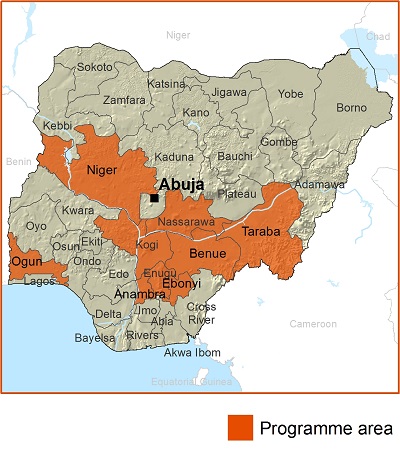Value Chain Development Programme
IFAD Asset Request Portlet
Asset Publisher
Value Chain Development Programme
This programme takes a holistic and demand-driven approach to addressing constraints along the cassava and rice value chains. It does so through an inclusive strategy, strengthening the capacity of actors along the chain – including producers and processors – as well as public and private institutions, service providers, policy-makers and regulators.
At the same time, the programme strongly emphasizes the development of commodity-specific Value Chain Action Plans at the local government level, which serve as the basis for rolling out sustainable activities to reduce poverty and accelerate economic growth. The objective is to sustainably enhance rural incomes and food security. The target groups include 15,000 smallholder farming households, 1,680 processors and 800 traders.
- Developing agricultural markets and increasing market access for smallholder farmers and small to medium-scale agro-processors
- Enhancing smallholder productivity – and thus increasing the volume and quality of marketable produce – by strengthening farmers' organizations as well as supporting smallholder production.

President's reports
President's reports
Project design reports
Project design reports
Supervision and implementation support documents
Supervision and implementation support documents
Supervision mission, March 2018
Supervision mission, July 2017
Supervision mission, June 2016
Supervision report, May 2015
Environmental and social impact assessment
Final environmental and social management framework
Interim (mid-term) review report
Interim (mid-term) review report
Resettlement action framework
PCR digest
Special study
Project list
Audit and Financial Statements
Audit and Financial Statements
Project completion report
Co-financiers
Related
Related
Clean energy, thriving rural communities
Rural communities need energy to develop, but in a rapidly heating world, a green transition is crucial. Renewable sources, like solar power and biogas, are allowing them to prosper without relying on polluting fossil and wood fuels.
Seeds to riches: The story of a 29-year-old millionaire
Empowering and protecting rural women in the time of coronavirus
The April morning sun beats down on Kontagora, a lively market town in central Nigeria. Generators hum as milling machines husk the brown bran from rice grains, revealing glistening white kernels. COVID-19 is on everybody’s mind. But the thriving Tudun Wada South Rice Processors women’s cooperative is open for business.